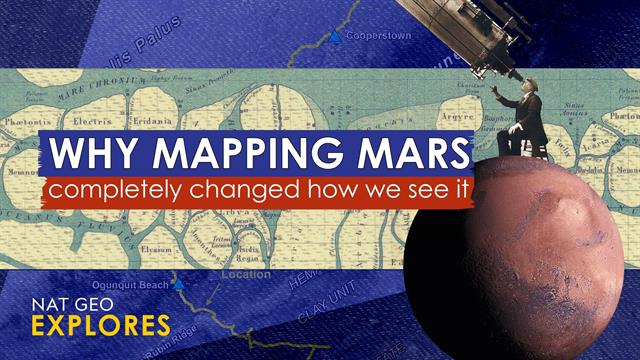Mapping Mars: The Impact Of Early Cartographic Rivalries

Welcome to your ultimate source for breaking news, trending updates, and in-depth stories from around the world. Whether it's politics, technology, entertainment, sports, or lifestyle, we bring you real-time updates that keep you informed and ahead of the curve.
Our team works tirelessly to ensure you never miss a moment. From the latest developments in global events to the most talked-about topics on social media, our news platform is designed to deliver accurate and timely information, all in one place.
Stay in the know and join thousands of readers who trust us for reliable, up-to-date content. Explore our expertly curated articles and dive deeper into the stories that matter to you. Visit NewsOneSMADCSTDO now and be part of the conversation. Don't miss out on the headlines that shape our world!
Table of Contents
Mapping Mars: The Impact of Early Cartographic Rivalries
The red planet has captivated humanity for centuries, inspiring countless works of fiction and fueling ambitious scientific endeavors. But long before rovers traversed its dusty plains and orbiters meticulously charted its canyons, the mapping of Mars was a fiercely competitive arena, shaped by national rivalries and the limitations of early telescopic observation. These early cartographic struggles, far from being mere historical footnotes, profoundly impacted our understanding of Mars and laid the groundwork for the sophisticated planetary science we see today.
The Dawn of Martian Cartography: A Race to Define the Red Planet
The 19th century witnessed a surge in astronomical observation, with astronomers across Europe and beyond turning their telescopes towards Mars during its close approaches to Earth. This period saw the birth of Martian cartography, a field fraught with challenges and intense competition. Limited telescopic resolution and the inherent difficulties of observing a distant planet led to significant discrepancies between early maps.
-
The Schiaparelli Influence: Giovanni Schiaparelli, an Italian astronomer, produced influential maps in the late 19th century. His observations, though later proven inaccurate in some respects, sparked intense debate. His descriptions of "canali," often translated as "canals," fueled speculation about intelligent life on Mars, igniting the public imagination and driving further research. This interpretation, while ultimately incorrect (the features were later identified as natural geological formations), significantly impacted the direction of Martian research for decades.
-
The Lowell Legacy: Percival Lowell, a wealthy American astronomer, built upon Schiaparelli's work, publishing his own detailed maps showing extensive canal systems. Lowell's influential writings cemented the idea of Martian canals in the public consciousness, though his interpretations were eventually debunked by improved telescopic observations and later space missions. However, Lowell's dedication to Martian observation and mapping spurred further interest and investment in planetary science.
From Canals to Craters: The Evolution of Martian Mapping
The 20th century brought advancements in telescope technology and the advent of space exploration. The blurry "canals" gradually gave way to a more accurate, albeit still incomplete, picture of Mars. The early space missions of the Mariner and Viking programs provided the first close-up images of the Martian surface, revolutionizing our understanding of the planet's geology and challenging long-held assumptions.
- The Space Race and Martian Mapping: The Cold War competition between the US and the Soviet Union indirectly fueled the exploration of Mars. The desire to demonstrate technological superiority led to a significant investment in space exploration, including ambitious projects aimed at mapping and understanding the red planet. This period marked a shift from speculative cartography to data-driven scientific mapping.
Modern Martian Cartography: A Collaborative Effort
Today, Martian mapping is a collaborative, international effort. High-resolution images from orbiters like Mars Reconnaissance Orbiter (MRO) and data from rovers like Curiosity and Perseverance provide unprecedented detail, enabling scientists to create incredibly precise maps of the Martian surface. These modern maps are not simply representations of topography; they are rich datasets containing information about surface composition, mineral distribution, and potential subsurface features.
- The Future of Martian Cartography: Future missions, including sample return missions and potentially human missions to Mars, will further refine our understanding of the planet. Advanced mapping techniques and technologies will continue to push the boundaries of our knowledge, revealing even more about Mars's captivating past and potential for future exploration.
The early, often competitive, attempts to map Mars, while sometimes flawed, played a crucial role in shaping the field of planetary science. The legacy of these early rivalries serves as a reminder of the human drive to explore and understand the cosmos, a drive that continues to propel our quest to unravel the mysteries of the red planet.

Thank you for visiting our website, your trusted source for the latest updates and in-depth coverage on Mapping Mars: The Impact Of Early Cartographic Rivalries. We're committed to keeping you informed with timely and accurate information to meet your curiosity and needs.
If you have any questions, suggestions, or feedback, we'd love to hear from you. Your insights are valuable to us and help us improve to serve you better. Feel free to reach out through our contact page.
Don't forget to bookmark our website and check back regularly for the latest headlines and trending topics. See you next time, and thank you for being part of our growing community!
Featured Posts
-
 Logitech G522 Lightspeed Features Specs And Price Of The New Wireless Gaming Headset
May 24, 2025
Logitech G522 Lightspeed Features Specs And Price Of The New Wireless Gaming Headset
May 24, 2025 -
 Austin To Host Teslas First Driverless Robotaxi Deployment
May 24, 2025
Austin To Host Teslas First Driverless Robotaxi Deployment
May 24, 2025 -
 Wall Street Goes Onchain Krakens Launch Of Tokenized Equities Imminent
May 24, 2025
Wall Street Goes Onchain Krakens Launch Of Tokenized Equities Imminent
May 24, 2025 -
 Josh O Connor Joel Coen And Cannes Film Festival Your Daily Entertainment News Roundup
May 24, 2025
Josh O Connor Joel Coen And Cannes Film Festival Your Daily Entertainment News Roundup
May 24, 2025 -
 The Wheel Of Time Fantasy Series Cancelled By Amazon Prime Video
May 24, 2025
The Wheel Of Time Fantasy Series Cancelled By Amazon Prime Video
May 24, 2025
